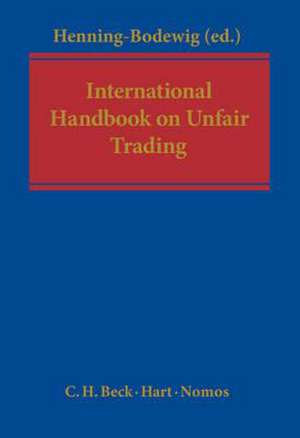International Handbook on Unfair Competition
Autor Henning-Bodewig Editat de Frauke Henning-Bodewigen Limba Engleză Hardback – 30 ian 2013
Preț: 1780.30 lei
Preț vechi: 2070.11 lei
-14% Nou
Puncte Express: 2670
Preț estimativ în valută:
340.69€ • 353.68$ • 284.09£
340.69€ • 353.68$ • 284.09£
Carte disponibilă
Livrare economică 03-17 martie
Preluare comenzi: 021 569.72.76
Specificații
ISBN-13: 9781849463683
ISBN-10: 1849463689
Pagini: 600
Dimensiuni: 171 x 244 x 22 mm
Greutate: 1.23 kg
Ediția:New.
Editura: Beck/Hart
Locul publicării:London, United Kingdom
ISBN-10: 1849463689
Pagini: 600
Dimensiuni: 171 x 244 x 22 mm
Greutate: 1.23 kg
Ediția:New.
Editura: Beck/Hart
Locul publicării:London, United Kingdom
Notă biografică
Frauke Henning-Bodewig is head of a research unit at the Max Planck Institute for Intellectual Property in Munich and professor at the University of Erlangen. The authors are experts from the countries they report on.
Cuprins
Table of ContentsA) General§ 1 What is Unfair Competition?§ 2 International Protection Against Unfair Competition§ 3 Regional Protection Against Unfair CompetitionB) Country Reports§ 1 Australia § 2 Austria § 3 Brazil § 4 Canada § 5 China § 6 France § 7 Germany § 8 Hungary § 9 India § 10 Italy § 11 Japan § 12 Lithuania § 13 Netherlands § 14 Poland § 15 Spain § 16 South Africa § 17 Sweden § 18 Switzerland § 19 Turkey § 20 UK§ 21 USA C) Outlook
Recenzii
There are at least three broad reasons why this book should be regarded as a welcome addition to any law library. First, it gives easy access to a wide variety of legal jurisdictions, many of whose laws are only comprehensible to those familiar with their respective native languages, to an English-reading audience. In addition, key legal terms in French and German, for example, are identified and explained in English to give the reader a more nuanced understanding of the jurisprudential contours of these legal systems. Furthermore, each country report includes a very substantial bibliography of reference materials relevant to the unfair competition laws of that particular jurisdiction. Secondly, despite the relatively modest length of each country report, the authors have succeeded in providing the reader with a sufficiently comprehensive picture of the different facets of their respective unfair competition law regimes. General clauses in statutes are analysed alongside leading case law from national and, in the case of Europe, supranational tribunals. Activity-specific regulations dealing with diverse practices, from ambush marketing to comparative advertising, and from trademark dilution to consumer protection regulations, are also examined in some detail. Thirdly, through the first few chapters of the book, the editor has done a very commendable job of constructing a helpful conceptual and thematic framework for understanding the many different moving parts that make up the machinery behind each country’s unfair competition laws.
